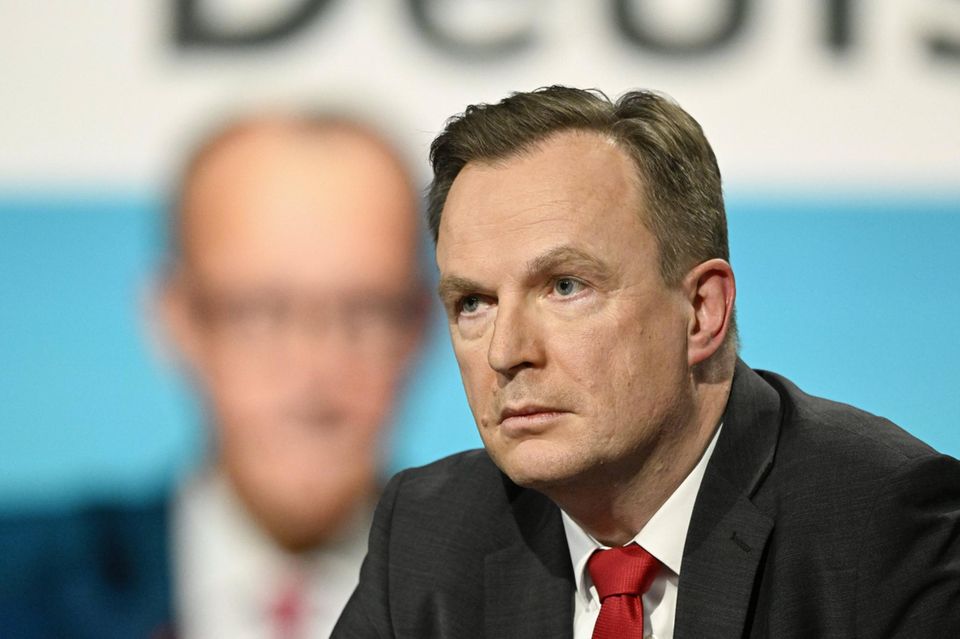National debt: Debt brake: Bundesbank urges reforms

More money for defense and infrastructure should enable a reform of the debt brake in the Basic Law. The Bundesbank wants to present a proposal on how this could be achieved "within two weeks" - and will base itself on its old idea
The future governing parties in Berlin will only have to wait a few more days for the Bundesbank's concept for revising the German fiscal rules. "We will present a proposal in less than two weeks," said Bundesbank President Joachim Nagel on Tuesday during the annual press conference. "I hope that this proposal will be looked at."
Nagel was reacting to the rush in Berlin to either reform the debt brake enshrined in the Basic Law, possibly before the new Bundestag is formed, or to finance defence or infrastructure expenditure using one or more so-called special funds. The aim is to use the two-thirds majority of the CDU/CSU, FDP, Greens and SPD parties in the old Bundestag to make the necessary changes to the Basic Law. In the new parliament, this would only be possible with the Left Party, which is traditionally keen to spend money but has always been critical of defence expenditure by Western nations.
Nagel announced that the Bundesbank would build on a proposal that is already three years old. Its core is to allow the federal government to take on higher new debts as long as its debt level is less than 60 percent of German economic output. This limit is one of the EU Maastricht criteria for participation in the European Monetary Union, which is currently being violated by many euro countries.

Germany is just above the threshold. However, due to inflation and hardly any new debt, its ratio is constantly falling, so that according to the Bundesbank's proposal at the time, more new loans would be possible. In 2022, it proposed allowing net borrowing of 1.5 percent of gross domestic product below the 60 percent mark; between 60 and 90 percent, it should still be 0.5 percent of GDP. Currently, the Basic Law only allows the federal government to take on new debt of 0.35 percent of GDP.
The Maastricht rules stipulate that each euro country may incur net new debt of a maximum of three percent of GDP per year, which is calculated from the European Central Bank's inflation target of two percent plus an expected productivity increase of one percent.
No money from Frankfurt for BerlinNagel did not comment on specific quotas or figures in the announced proposal, nor on what the larger "structural component" in the proposal would mean. However, he announced that it would also cover possible special funds. In order to circumvent the debt brake, the "traffic light" government, with the support of the CDU/CSU, had anchored a special fund of 100 billion euros for the Bundeswehr in the Basic Law.
In view of Russia's ongoing rearmament, this is no longer considered sufficient to finance national defense. "We will need a new special fund or a change to the debt brake," said Monika Schnitzer, chairwoman of the German Council of Economic Experts ("Wirtschaftweise") and professor at the LMU Munich, in an interview with Capital.

"We are in a different environment than we were 15 years ago, when the debt brake practically saw the light of day," said Nagel. The "new fiscal challenges" are taken into account. At the same time, the proposal takes European rules into account and is geared towards stability policy. Stability policy is understood to mean a cautious government spending policy in order to avoid the risk of inflation. At the same time, Nagel called for the federal budget to be searched for savings opportunities beyond investments. "Politicians must look at consumer spending."
19 billion euros annual lossWhile the new government can hope to receive support for more debt from the Bundesbank, which has always been focused on stability policy, it will not be able to count on profit distributions from Frankfurt for years to come. The reason: As a result of the interest rate turnaround in the eurozone, the national central banks and the ECB have suffered high balance sheet losses. The bonds they have bought up on a large scale pay less interest than the commercial banks received on deposits. While the Bundesbank received an average interest rate of 0.54 percent on the bonds it bought as part of quantitative easing last year, it paid 3.81 percent interest on commercial bank deposits.
The result: a balance sheet loss of EUR 19.8 billion for the Bundesbank in 2024, which amounted to EUR 19.2 billion after the release of reserves. "The balance sheet loss will continue to grow for several years," said Nagel. The beneficiaries of the high losses are the commercial banks and the savings customers of providers with very high deposit interest rates.

"The Bundesbank can absorb losses that have occurred and will occur with its net equity of EUR 251 billion," stressed Vice President Sabine Mauderer. The Bundesbank's gold holdings, which she says have a valuation reserve of EUR 263 billion, are also proving to be a stabilizer of the balance sheet. This means that the Bundesbank's gold is currently worth EUR 263 billion more at market prices than is stated on the balance sheet.
By revaluing the balance sheet, the Bundesbank could offset its losses or even make book profits. In the past, politicians have repeatedly made attempts to eliminate this item. The Bundesbank has repeatedly rejected this and insisted on its independence.
capital.de






